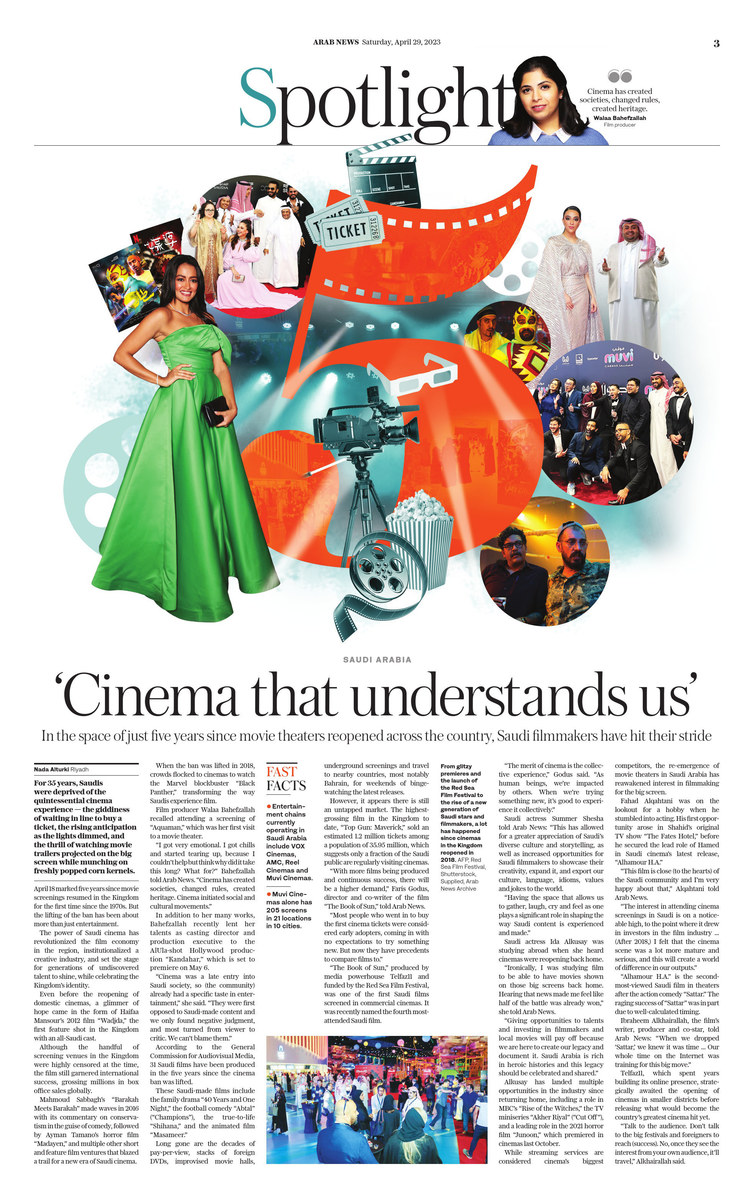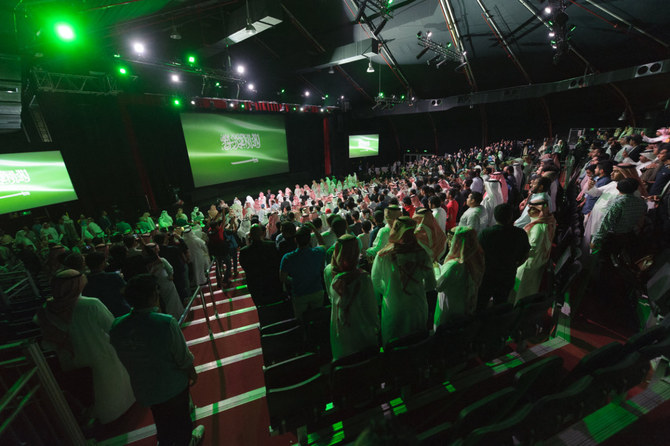RIYADH: For 35 years, Saudis were deprived of the quintessential cinema experience — the giddiness of waiting in line to buy a ticket, the rising anticipation as the lights dimmed, and the thrill of watching movie trailers projected on the screen while munching on freshly popped corn kernels.
April 18 marked five years since the resumption of movie screening across the Kingdom for the first time since the 1970s. But the lifting of the ban has been about more than mere entertainment.
The power of Saudi cinema has revolutionized the film economy in the region, institutionalized a creative industry, and set the stage for generations of undiscovered talent, while celebrating the Kingdom’s identity.
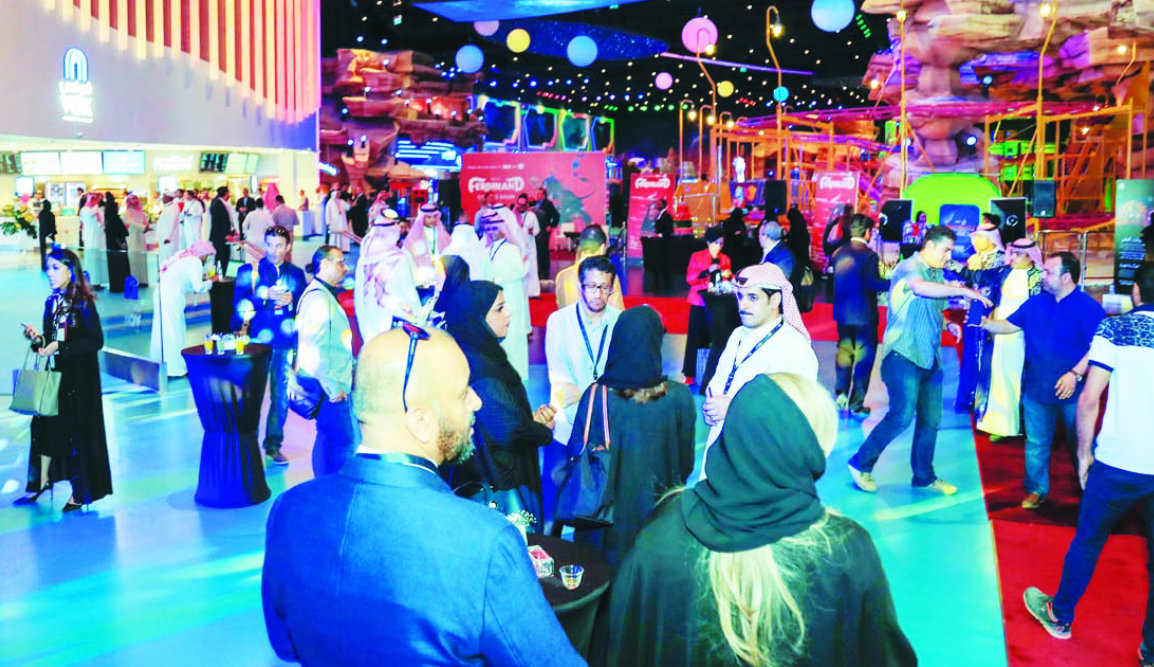
A lot has happened since cinemas in the Kingdom reopened in 2018. (Arab News Archive)
Even before the reopening of domestic cinemas, a glimmer of hope came in the form of Haifaa Mansour’s 2012 film “Wadjda,” the first all-Saudi cast feature shot in Saudi Arabia.
Although the handful of screening venues in the Kingdom were highly censored at the time, the film still garnered international success, grossing millions in box office sales globally.
Mahmoud Sabbagh’s “Barakah Meets Barakah” made waves in 2016 with its commentary on conservatism in the guise of comedy, followed by Ayman Tamano’s horror film “Madayen,” and multiple other short and feature film ventures that blazed a trail for a new era of cinema.
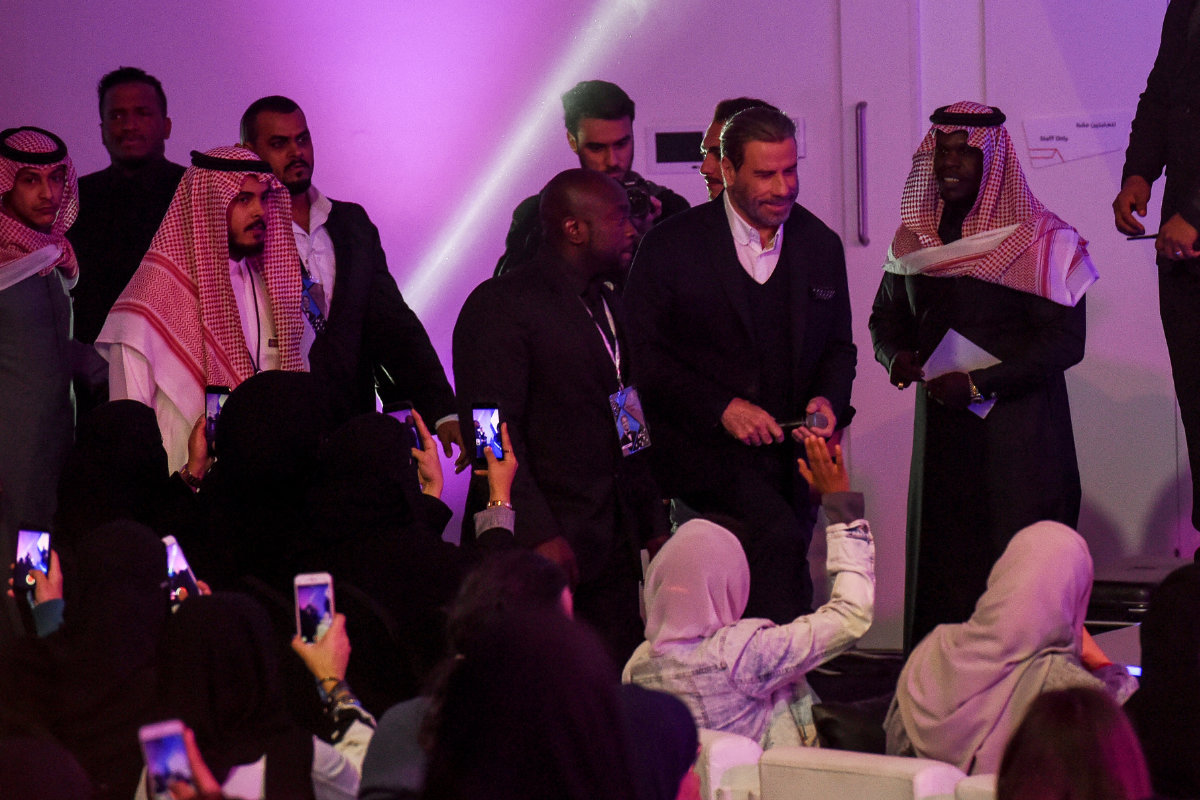
Hollywood actor John Travolta attending a special event organized by the Kingdom's General Authority for Entertainment in Riyadh in 2017. (AFP)
When the ban was lifted in 2018, crowds flocked to cinemas to watch the iconic Marvel blockbuster “Black Panther,” transforming the way Saudis experience film to this day.
Film producer Walaa Bahefzallah recalls attending a screening of “Aquaman,” marking her first visit to a movie theater.
“I got very emotional. I got chills and started tearing up, because I couldn’t help but think ‘Why did it take this long? What for?’” Bahefzallah told Arab News. “Cinema has created societies, changed rules, created heritage. Cinema initiated social and cultural movements.”
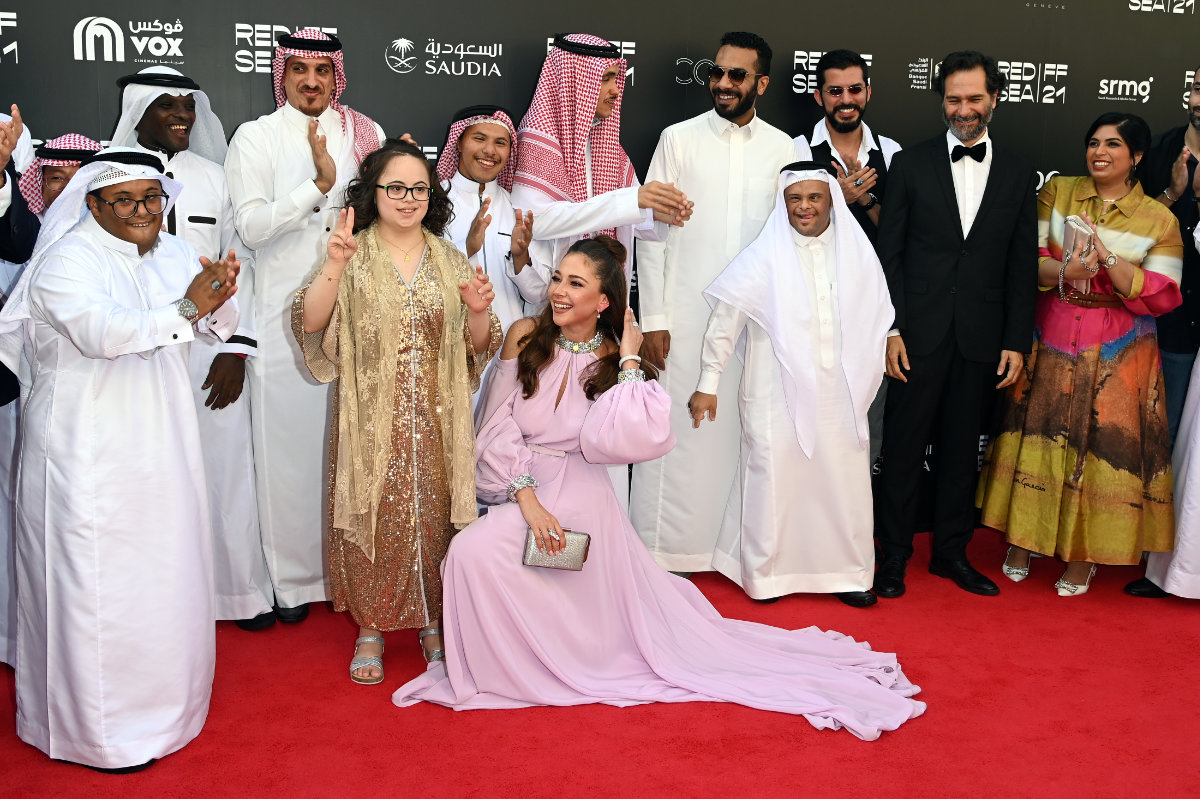
Walaa Bahefzallah (right), casting director of Saudi film Champions, alongside the cast at the 2021 Red Sea Film Festival, including Fatima Albanawi (center). (Supplied)
Bahefzallah graduated from film school in 2010 at the top of her class, but had been working in the industry since 2007 in Egypt. In 2013 she established Rose Panthera, an experimental production company.
In addition to her many works, Bahefzallah has recently lent her talents as the casting director and production executive of the AlUla-shot Hollywood production “Kandahar,” set to premiere on May 6.
“Cinema was a late entry into Saudi society, so (the community) already had a specific taste in entertainment,” she said. “They were first opposed to Saudi-made content and we only found negative judgment, and most turned from viewer to critic. We can’t blame them.
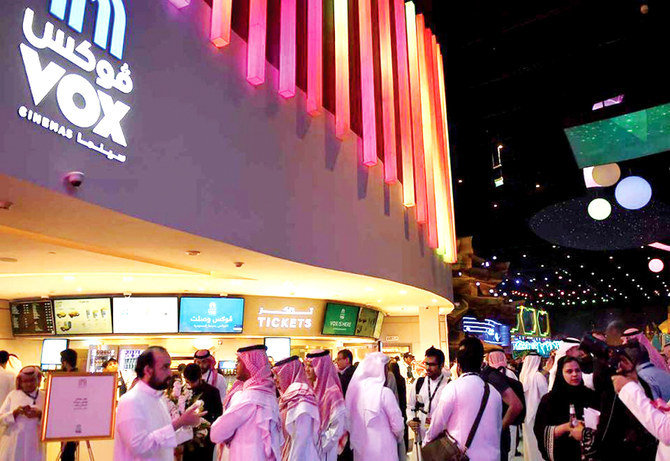
The number of ticket sales in Saudi Arabia amounted to 30,860,956 for films in 22 languages from 38 countries since 2018. (Social Media)
“Lately — after ‘Shams Al-Maaref’ (‘The Book of Sun’), ‘Abtal,’ ‘Sattar’ and ‘Alhamour H. A.’ — they realized there’s a new era of cinema being built and a one that speaks to our minds and our issues, in our own language and sense of humor — a cinema that understands us.”
According to the General Commission for Audiovisual Media, 31 Saudi films have been produced in the five years since the cinema ban was lifted.
These Saudi-made films include the family drama “40 Years and One Night,” the football comedy “Abtal” (“Champions”), the true-to-life “Shihana,” and the animated film “Masameer.”
Long gone are the decades of pay-per-view, stacks of foreign DVDs, improvised movie halls, underground screenings and travels to nearby countries, most notably Bahrain, for a weekend of binge-watching the latest releases.
And, just as cinema footfall and profits are in decline elsewhere in the world, box-office revenues in the Middle East and North Africa region have rapidly bounced back, largely thanks to the success of Saudi cinemas.
FASTFACTS
Entertainment chains currently operation in Saudi Arabia include VOX Cinema, AMC, Reel Cinemas and Muvi Cinemas.
Muvi Cinemas alone has 205 screens in 21 locations in 10 different cities.
However, it appears there is still an untapped market in the Kingdom. The highest-grossing film in Saudi Arabia to date, “Top Gun: Maverick,” sold an estimated 1.2 million tickets among a population of 35.95 million, which suggests only a fraction of the Saudi public are regularly visiting cinemas.
“With more films being produced and continuous success, there will be a higher demand,” Faris Godus, director and co-writer of “The Book of Sun,” told Arab News.
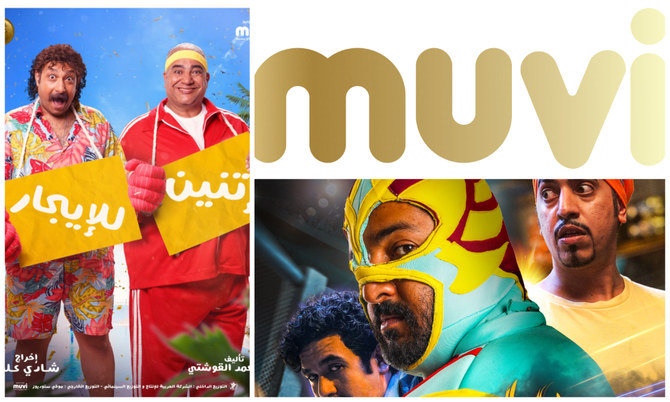
Muvi Studios is breaking records at the Saudi box office, with more than 1 million tickets sold for its two latest productions. (Supplied)
“Most people who went in to buy the first cinema tickets were considered early adopters, coming in with no expectations to try something new. But now they have precedents to compare films to.”
“The Book of Sun,” a production from The Godus Brothers’ Tape Productions, funded by the Red Sea Film Festival, was one of the first Saudi films to be screened in commercial cinemas. It was recently named the fourth most-attended Saudi film.
“The merit of cinema is the collective experience,” Godus said. “As human beings, we’re impacted by others. When we’re trying something new, it’s good to experience it collectively.
“When we watched ‘The Book of Sun’ in theaters, some people were laughing at lines or getting excited at parts I didn’t know would have that sort of impact. It created a first impression of the film that spread widely through word of mouth. It was great and I believe Saudi films are in need of this stage of engagement.”
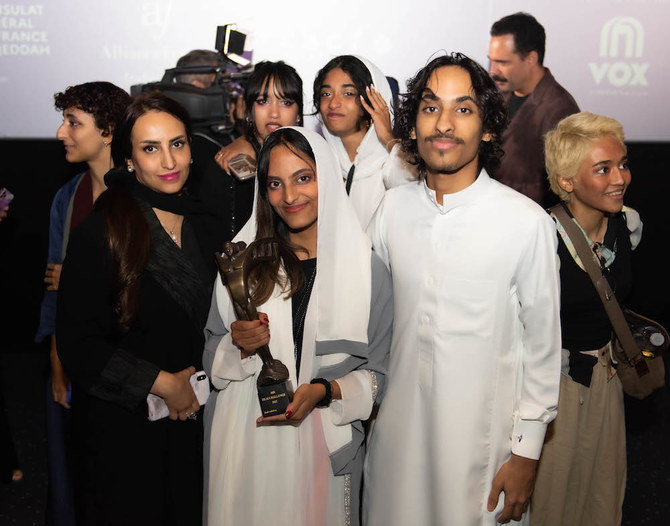
Two young Saudi film directors have been presented with trophies after winning the second edition of a 48-hour filmmaking challenge. (AN Photo/Ali Khameq)
Indeed, Saudi filmmakers appreciate how cinema-going creates community bonds that allow them to draw feedback from their audiences.
“This has allowed for a greater appreciation of Saudi’s diverse culture and storytelling, as well as increased opportunities for Saudi filmmakers to showcase their creativity, expand it, and export our culture, language, idioms, values and jokes to the world,” Saudi actress Summer Shesha told Arab News.
“Having the space that allows us to gather, laugh, cry and feel as one plays a significant role in shaping the way Saudi content is experienced and made.”
Shesha said that she cried when she heard the news that cinemas would reopen. She had taken part in her first feature film role in 2017’s “Exit 5,” but only ever saw it screened at festivals.
“Then experiencing watching my second feature ‘Kayan,’ directed by Hakeem Jomaa, in the theater among my friends, family and the audience is a feeling I will never forget,” she said.
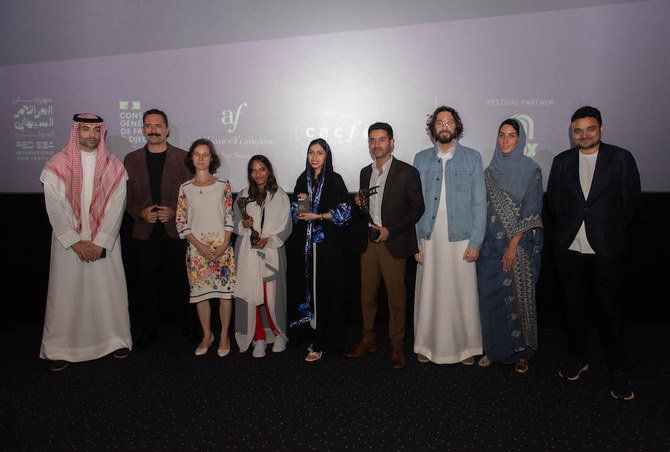
Two young Saudi film directors have been presented with trophies after winning the second edition of a 48-hour filmmaking challenge. (AN Photo/Ali Khameq)
“It was surreal, to see my face on the big screen and hear and see the reaction of my people at the same time. This memory still gives me goosebumps.
“I was grateful to be a part of an industry that did not even exist, and that I believed in what I loved and did it anyway, to witness and contribute to this significant change.”
Saudi actress Ida Alkusay was studying abroad when she heard the news that cinemas were reopening in her home country.
“Ironically, I was studying film to be able to have movies shown on those big screens back home. Hearing that news made me feel like half of the battle was already won,” Alkusay told Arab News.
Prior to 2018, a role in a rising, yet premature, film industry was a pipedream for many aspiring actors. Supported by the Saudi Film Commission, which has worked to legitimize the local film industry and create job opportunities, there has never been a better time to pursue a career in Saudi cinema.
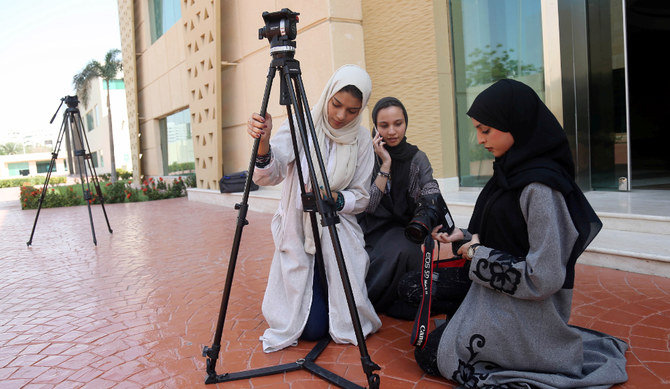
Saudi women study film making at a university in Jeddah, Saudi Arabia March 7, 2018. (REUTERS)
“Giving opportunities to talents and investing in filmmakers and local movies will pay off because we are here to create our legacy and document it,” Alkusay said. “Saudi Arabia is rich in heroic histories and this legacy should be celebrated and shared.”
The actress has landed multiple opportunities in the industry since returning home, including a role in MBC’s “Rise of the Witches,” the TV mini-series “Akher Riyal” (“Cut Off”), and a leading role in the 2021 horror film “Junoon,” which premiered in cinemas last October.
Brothers Maan B. and Talha B., the film’s producers, told Arab News: “Seeing your debut film being watched is something inspiring. When we studied film in 2013, we never thought this day would come.
“We think greater and bolder films will follow in the next five to ten years because the audience is smarter than you think and they want something both entertaining and thought-provoking, not something shallow they can watch for free in the comfort of their homes. This makes things more challenging for us filmmakers, as we are competing with streaming services and social media content.”
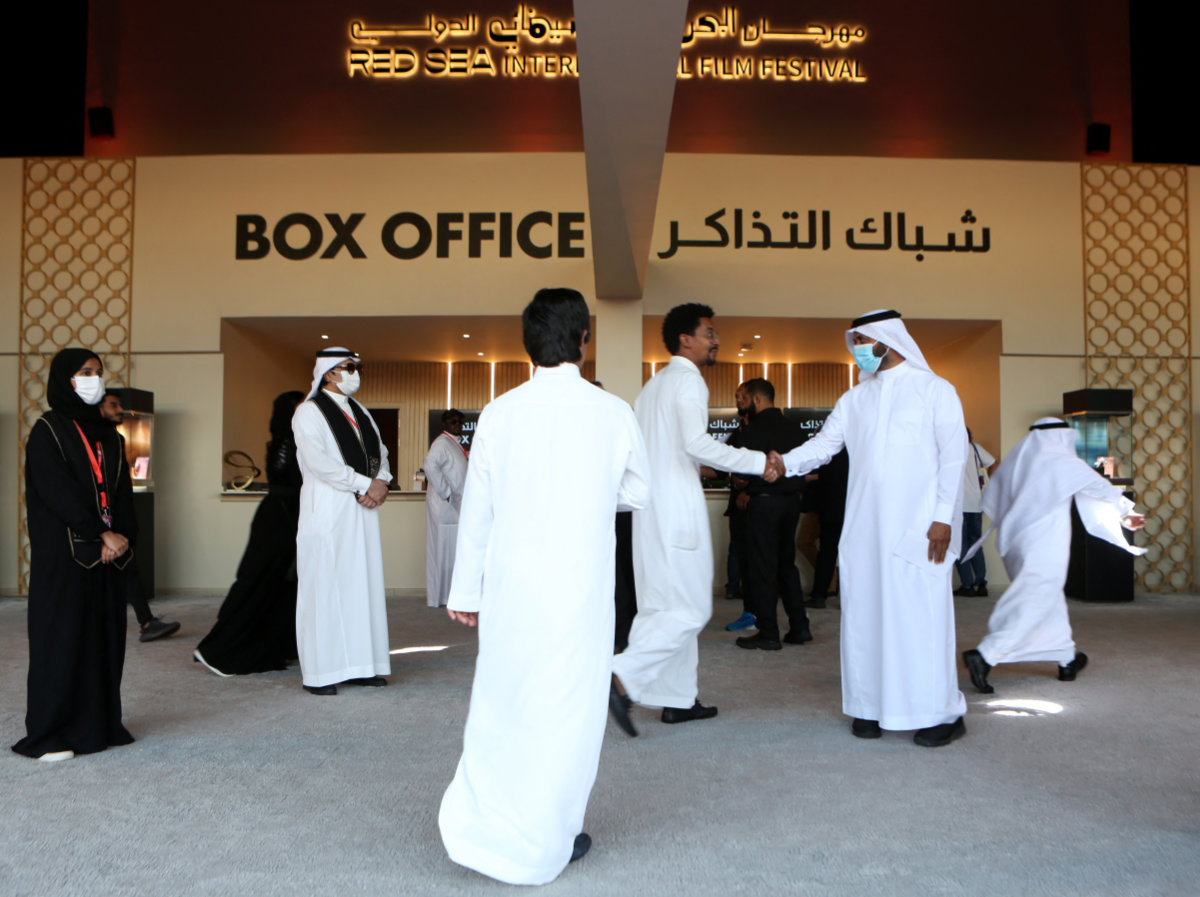
The opening of theaters in the Kingdom has been widely welcomed by the Saudis, who used to flock to Bahrain or Dubai to for entertainment. (Photo Courtesy: Red Sea Film Festival)
While streaming services are considered cinema’s biggest competitors, the re-emergence of movie theaters in Saudi Arabia has reawakened interest in filmmaking for the big screen.
Maan B., who also starred in and co-directed “Junoon,” said: “A lot of people who had that passion wanted to get back into the game.
“A lot of universities are helping with that by providing film or media majors highlighted in their programs, and it’s drawing a lot of attention from the newer generation.
“I envy the new generation. It’s all set up for them and they need to take advantage of it all — the opportunities, the support, the funds — to be recognized and do good work.”
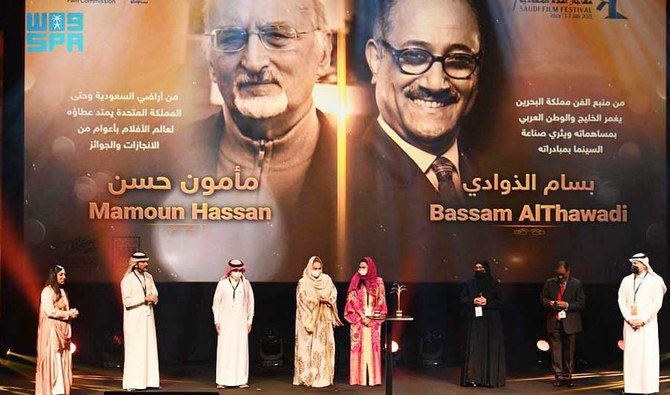
The Saudi Film Festival highlights desert cinema in an interactive artwork inspired by the Tuwaiq mountains. (SPA)
Fahad Alqahtani was on the lookout for a hobby when he stumbled into acting. His first opportunity arose in Shahid’s original TV show “The Fates Hotel,” before later securing the lead role of Hamed in Saudi cinema’s latest release “Alhamour H.A.”
“This film is close (to the hearts) of the Saudi community and I’m very happy about that,” Alqahtani told Arab News.
“The interest in attending cinema screenings in Saudi is on a noticeable high, to the point where it drew in investors in the film industry ... (After 2018) I felt that the cinema scene was a lot more mature and serious, and this will create a world of difference in our outputs.”
The movie is the second-most-viewed Saudi film in theaters after the action comedy “Sattar.” The raging success of “Sattar” was in part due to well-calculated timing.
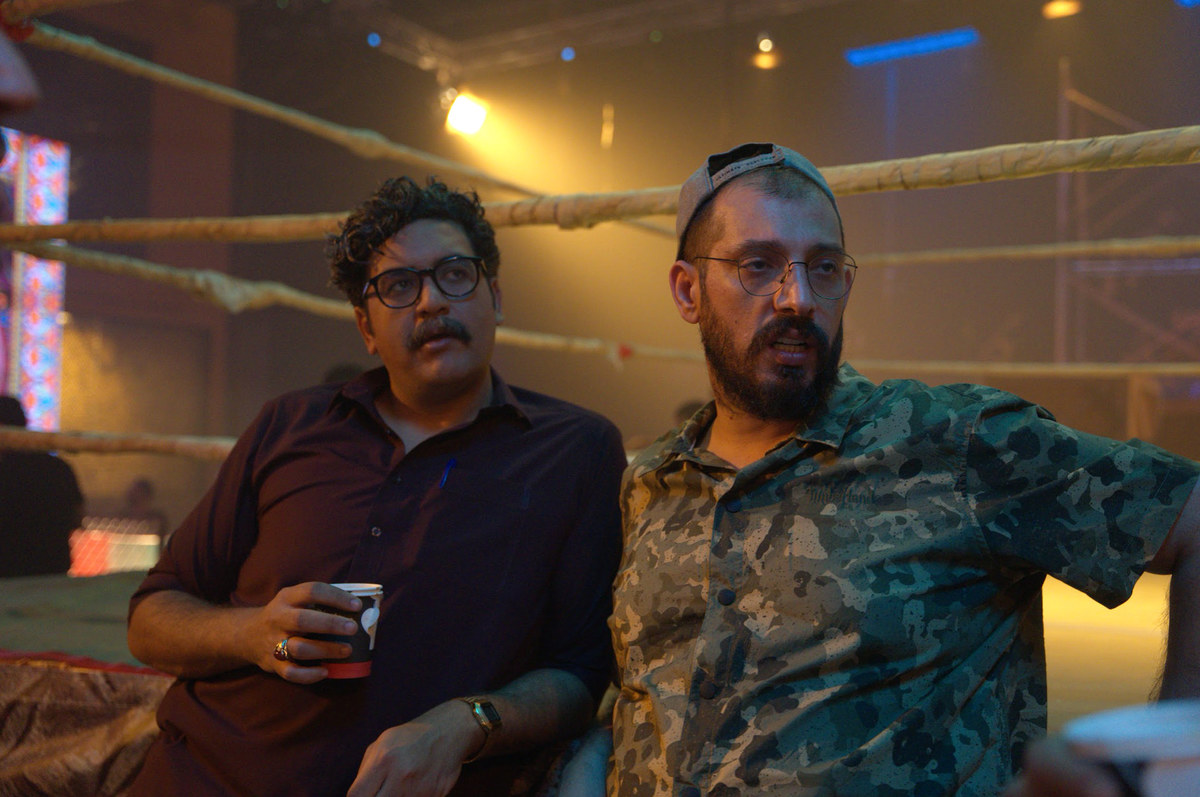
The Saudi comedy “Sattar” received high praise since its premiere last year, and has recently become the highest grossing Saudi movie with almost 900,000 ticket sales to date. (Supplied)
Ibraheem Alkhairallah, the film’s writer, producer, and co-star, told Arab News: “When we dropped ‘Sattar,’ we knew it was time ... Our whole time on the Internet was training for this big move.”
Telfaz11, which had spent years building its online presence, strategically awaited the establishment of cinemas in smaller districts before releasing what would become the country’s greatest cinema hit yet.
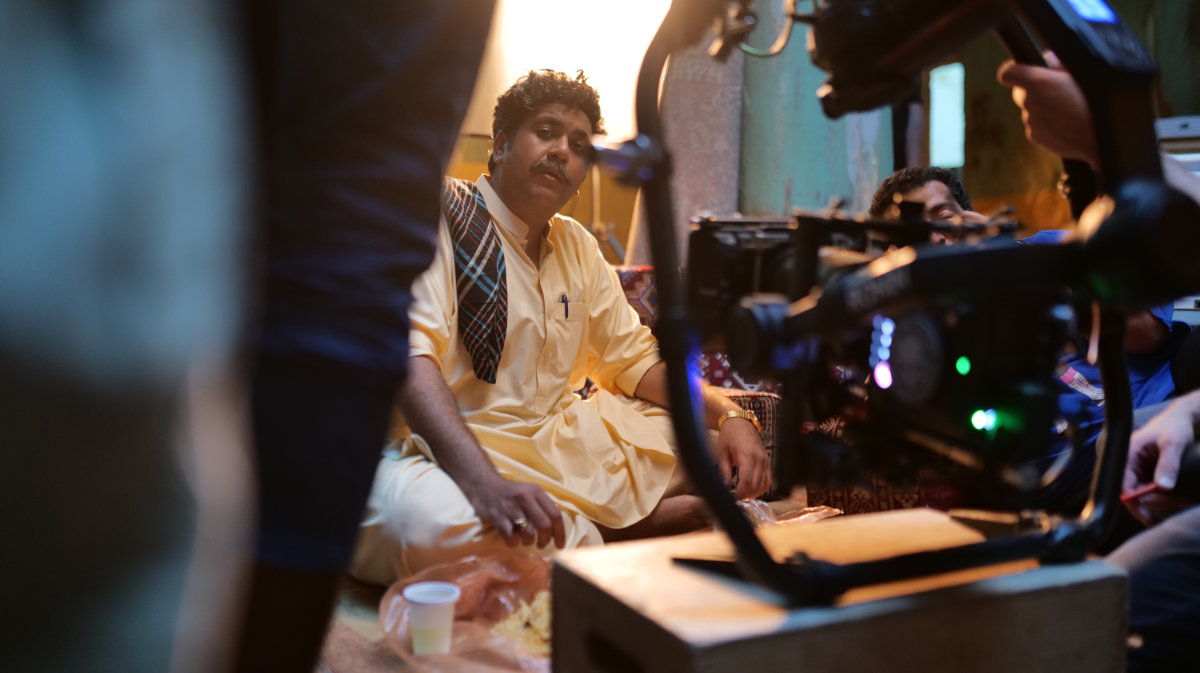
Ibraheem Alkhairallah on the set of Saudi film Sattar, where he portrayed the character of Abdulkhaleq, an undercover officer pretending to be a wrestling coach. (Supplied)
“The closest theater to the southern region isn’t Jeddah anymore; it’s Khamis Mushait, Abha. Hafar Al-Batin is not Dammam or Sharqiyah anymore — it’s themselves,” said Alkhairallah.
Khamis Mushait was one of the top five locations for the most ticket sales for screenings of “Sattar.” However, creatively speaking, Alkhairallah believes the film made a splash because it stayed true to Saudi culture.
“Talk to the audience. Don’t talk to the big festivals and foreigners to reach (success). No — once they see the interest from your own audience, it’ll travel.”
